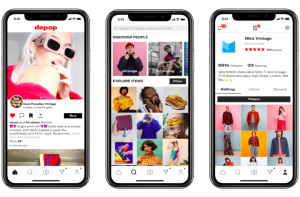- Depop is a peer-to-peer social shopping app based in London, with offices in Milan and New York.
- The company was founded in 2011 by entrepreneur Simon Beckerman.
- Depop has played a leading role in the increase in popularity of second hand and up-cycled couture.
About Depop
The Depop marketplace shows second-hand, vintage and ethically sourced goods for sale from across the globe. Depop was initially a social media network, not dissimilar to Instagram, that allowed readers of PIG Magazine to buy items featured in the publication via their smartphones. Co-founder, Simon Beckerman, re-envisioned the app to provide its selling function so that Depop could become the global marketplace it is today.
Depop currently has more than 200 employees, 10 million users and tens of millions of clothes, accessories and homewares for sale. Depop raised $62 million in Series C funding led by General Atlantic in June 2019.
How Does It Work?
Depop allows users to buy and sell goods from around the world through a mobile marketplace available on iOS and Android platforms. The app, like most social media platforms, enables users to ‘like’ products and follow others to keep up to date with what they are selling. To buy a product, users can make an offer and use the comments for any questions. The Depop newsfeed keeps customers up-to-date with the latest items posted by those they follow.

Since, 2011, the marketplace has evolved to create a culture of creative pre-loved fashion. Depop has played a leading role in the increase in popularity of second hand and up-cycled couture. CEO Maria Raga states: “Our Depop community has grown over the years to include an amazing, diverse set of creative people who are finding audiences and building their brands and businesses… Supporting our community has been integral to our business from the start”. The community is centred around seeing what your friends and inspirations are liking, buying, and selling to create an eco-system of creative inspiration. As a result, Depop has become a global movement in culture, design and creative communities around the world.
How Does Depop Help The Environment?
Many are keen to use Depop for environmental factors. For those making sustainability a priority when shopping, the pre-loved and up-cycled fashion marketplace is appealing. A recent study from A.T Kearney shows that the majority of Gen Z shoppers actively seek to find sustainably sourced clothing. They care about the climate crisis and want to combat the increasing demand for fast fashion which so heavily strains the environment. A UNECE study found the fashion industry to be the second-largest consumer of water worldwide. The younger generations will not ignore the environmental and humanitarian issues with many mass-produced fast-fashion brands. Gen-Z, in particular, are beginning to make changes in the industry trends by opting for second-hand goods, largely using the Depop platform.



